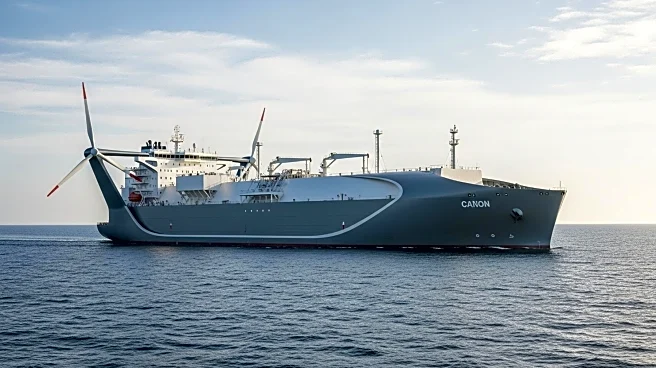What's Happening?
Mitsui O.S.K. Lines (MOL) is advancing its wind-assisted propulsion technology by developing innovative designs for LNG carriers. Collaborating with HD Hyundai Heavy Industries and Samsung Heavy Industries, MOL has created concepts that could achieve up to 30 percent fuel savings per voyage and 15 to 20 percent annually. The designs feature four rigid sails, which are capable of automatic extension, retraction, and rotation, optimizing fuel efficiency. The Wind Challenger system, previously installed on a coal carrier, demonstrated a reduction in daily fuel consumption by up to 17 percent. MOL has committed to installing this technology on 25 vessels by 2030 and 80 vessels by 2035. The new vessel designs have received Approval in Principle (AiP) from the Marshall Islands and Liberia, and detailed construction plans are underway.
Why It's Important?
The development of wind-assisted LNG carriers by MOL represents a significant step towards reducing the environmental impact of maritime transport. By achieving substantial fuel savings, these designs contribute to lower greenhouse gas emissions, aligning with global efforts to combat climate change. The collaboration with major shipbuilders and classification societies underscores the industry's commitment to innovation and sustainability. This advancement could set a precedent for other shipping companies to adopt similar technologies, potentially transforming the maritime industry and reducing its carbon footprint.
What's Next?
With the Approval in Principle secured, MOL is moving forward with detailed construction plans for the new vessel designs. As the company progresses, it is likely to face challenges related to the integration of wind-assisted technology on a larger scale. Stakeholders, including environmental groups and industry leaders, will be closely monitoring the implementation and performance of these vessels. Successful deployment could lead to broader adoption of wind-assisted propulsion in the shipping industry, influencing future regulatory standards and environmental policies.
Beyond the Headlines
The introduction of wind-assisted LNG carriers may have broader implications for maritime trade routes and logistics. Enhanced fuel efficiency could lead to cost savings for shipping companies, potentially affecting global trade dynamics. Additionally, the shift towards sustainable shipping practices may prompt further innovation in vessel design and propulsion technologies, fostering a culture of environmental responsibility within the industry.









